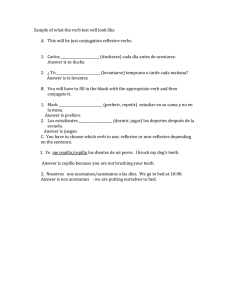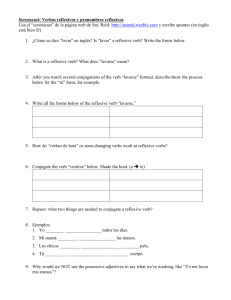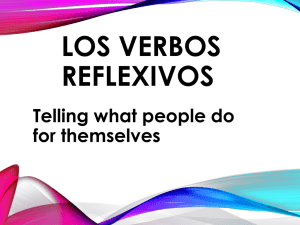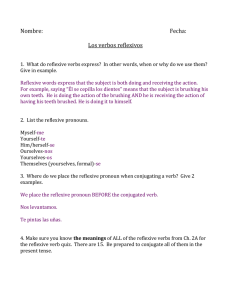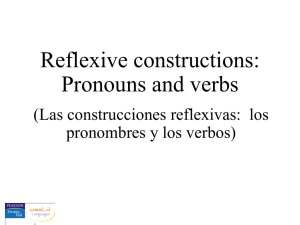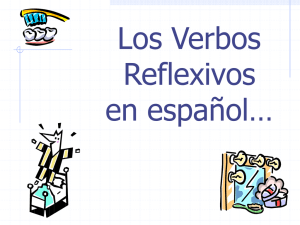Los Verbos Reflexivos en español…
advertisement
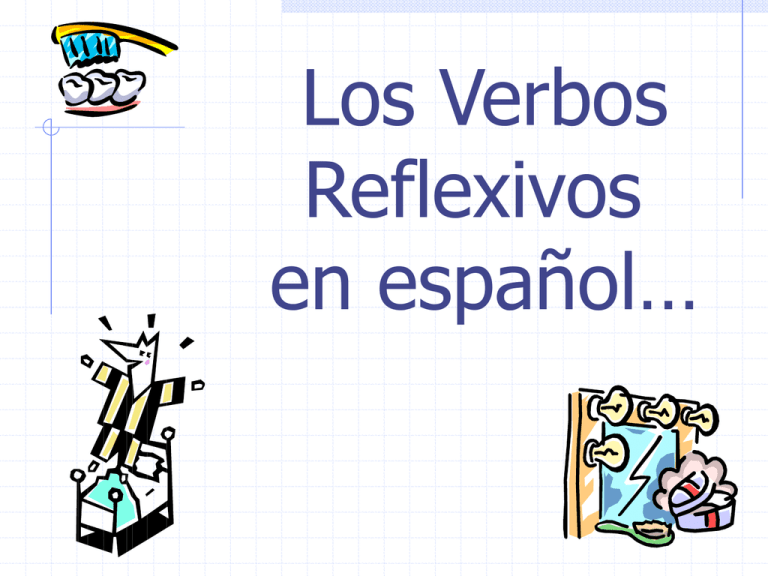
Los Verbos Reflexivos en español… Los Verbos Reflexivos In the reflexive construction, the subject is also the object A person does as well as receives the action… The subject, the pronoun and the verb are all in the same form… Examples in English In English, a sentence using a “so called” reflexive verb might be… Lauren brushes her hair. Scott bathes himself. Reflexive Verbs have 2 parts: LAVARSE(to wash oneself) Verb Reflexive Form Pronoun Reflexive Pronouns Me to or by myself Nos to or by ourselves Te to or by yourself Se to or by himself, Se to or by herself, itself, yourself (formal) themselves, yourself (plural) TO OR BY ONESELF You must remember that these are actions being done to oneself, by oneself. For example: I wash my (my own) hair. He brushes his (his own) teeth. Acostarse Bañarse Cepillarse Despertarse Lavarse Levantarse Maquillarse Peinarse Sentarse vs Acostar Bañar Cepillar Despertar Lavar Levantar Maquillar Peinar Sentar ¿Reflexivo o no? My mother puts my sister to bed early. I get up early in the morning. We have to bathe the dog now. My sister is combing her hair. My friends sit in the library. I wash the dishes in the kitchen. When using reflexive verbs to talk about parts of the body, use the definite article. (the el, la, los, las that mean “the”) Nos lavamos el pelo. Te cepillas los dientes? How do you form these verbs? levantarse 1. Conjugate the verb as always… 2. Add the reflexive pronouns… me levanto nos levantamos te levantas os levantáis se levanta se levantan despertarse (ie) me despierto nos despertamos te despiertas os despertáis se despierta se despiertan vestirse (i) me visto nos vestimos te vistes os vestís se viste se visten acostarse (ue) me acuesto nos acostamos te acuestas os acostáis se acuesta se acuestan cepillarse me cepillo nos cepillamos te cepillas os cepilláis se cepilla se cepillan Reflexive Pronouns They can either go before a conjugated verb or after an infinitive. Before the verb: Me voy a lavar el pelo. After the infinitive: Voy a lavarme el pelo. Por ejemplo: • Yo me levanto a las ocho de la mañana. I get up at eight in the morning. • Ella se despierta muy temprano. She wakes up very early. • ¿A qué hora te desayunas cada día? At what time do you have breakfast every day? • Mis hermanas se maquillan en su cuarto. My sisters put on makeup in their room. • Nosotros nos acostamos muy tarde. We go to bed very late. • Pepito se baña en el baño. Pepito takes a bath in the bathroom.
